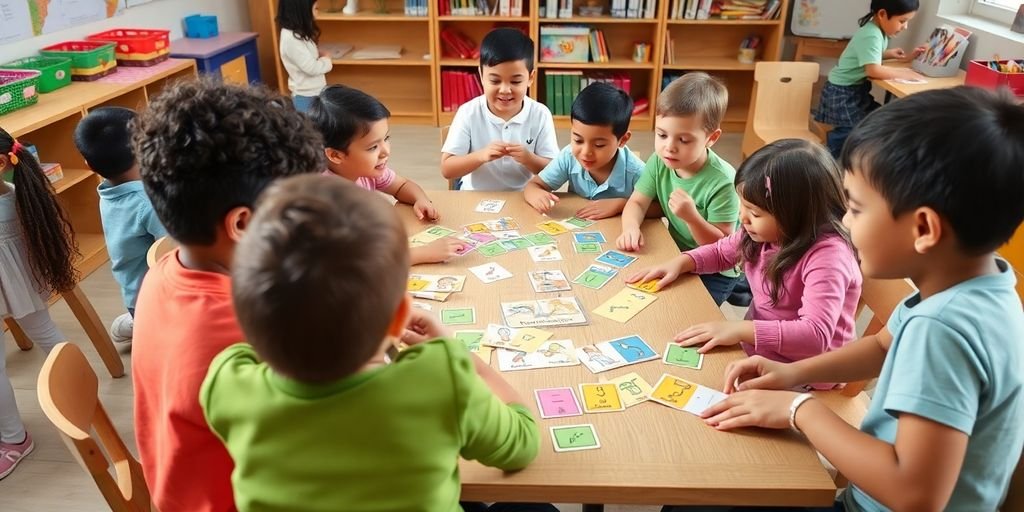
Teaching kids Portuguese can be an exciting journey filled with fun activities that make learning enjoyable. By using a variety of interactive methods, you can help your children pick up the language while having a great time. From storytime to outdoor adventures, there are countless ways to immerse your kids in Portuguese culture and language. Here are some key takeaways to guide your teaching efforts.
Key Takeaways
- Start with engaging storytime using colorful books to capture their interest.
- Incorporate interactive apps and games that make learning Portuguese fun and exciting.
- Use creative activities like puppetry and crafts to reinforce vocabulary in an enjoyable way.
- Explore the outdoors by naming animals and describing nature in Portuguese during family outings.
- Celebrate Portuguese culture through cooking, music, and festivals to enhance language learning.
Engaging Storytime: Using Books to Teach Portuguese
Choosing the Right Books for Different Ages
Selecting the right books is crucial for teaching Portuguese to kids. Here are some tips to help you choose:
- Age Appropriateness: Ensure the language and themes match the child’s age.
- Illustrations: Look for books with engaging pictures that can help kids understand the story.
- Cultural Relevance: Choose stories that reflect Portuguese culture to make learning more relatable.
Interactive Reading Techniques
To make storytime more engaging, try these interactive techniques:
- Ask Questions: Encourage kids to predict what will happen next.
- Use Different Voices: Make characters come alive by using various tones and accents.
- Point Out Words: As you read, point to words and phrases to reinforce learning.
Benefits of Picture Books in Language Learning
Picture books are a fantastic resource for language learning. Here are some benefits:
- Visual Learning: Images help kids remember words better.
- Engagement: Colorful illustrations keep children interested in the story.
- Cultural Exposure: Books can introduce kids to world languages and phrases, enriching their understanding of different cultures.
Reading together not only builds language skills but also strengthens the bond between you and your child.
By incorporating these strategies, you can make learning Portuguese a fun and enriching experience for your kids!
Interactive Apps and Games for Learning Portuguese
Top Portuguese Learning Apps for Kids
When it comes to teaching kids Portuguese, interactive apps can make learning fun and engaging. Here are some of the best apps available:
| App Name | Age Group | Key Features |
|---|---|---|
| Dinolingo | 4-10 | Fun dinosaur characters, self-paced learning |
| Droplets | 7+ | Word games, drawing activities, no ads |
| Conjuguemos | 6+ | Focus on verb conjugation, interactive exercises |
| Lingvist | 8+ | Vocabulary building, spaced repetition |
| Preply | 5+ | Personalized learning with tutors |
Incorporating Language Games into Daily Routine
Integrating language games into your child’s daily life can enhance their learning experience. Here are some ideas:
- Play word games during car rides or while waiting in line.
- Use flashcards to quiz them on vocabulary during meals.
- Incorporate songs in Portuguese to make learning enjoyable.
Balancing Screen Time with Educational Content
While technology is a great tool for learning, it’s important to manage screen time. Here are some tips:
- Set daily limits on app usage.
- Choose apps that offer educational value.
- Encourage offline activities that reinforce language skills.
By using these apps and games, you can create a fun and effective learning environment for your child. Remember, the earlier they start learning Portuguese, the easier it will be for them!
Creative Activities to Boost Portuguese Vocabulary
Using Puppets and Plush Toys for Language Practice
Using puppets and plush toys can make learning Portuguese exciting for kids. Children can engage in role-play where they create dialogues between their toys. This not only helps them practice vocabulary but also boosts their creativity. Here are some ideas:
- Create a story using different characters.
- Use toys to act out daily routines in Portuguese.
- Encourage kids to teach their toys new words.
Fun Flashcard Games to Reinforce Learning
Flashcards are a fantastic tool for vocabulary building. You can play various games to make it enjoyable:
- Go Fish: Use flashcards to match words with pictures.
- Memory Game: Lay cards face down and find pairs.
- Word Association: Say a word and have your child find the matching card.
Crafting and Drawing Activities with Portuguese Instructions
Crafting can be a fun way to learn. Give instructions in Portuguese while doing art projects. This helps kids connect words with actions. Here are some activities:
- Draw a scene and label it in Portuguese.
- Create a scrapbook with pictures and words.
- Make greeting cards using Portuguese phrases.
Engaging in these activities not only enhances vocabulary but also makes learning Portuguese a fun and memorable experience!
Outdoor Adventures: Learning Portuguese in Nature
Zoo Visits: Naming Animals in Portuguese
Visiting a zoo can be a fantastic way to teach kids Portuguese. Encourage them to name animals in Portuguese as they see them. Here are some animals to start with:
- Lion – Leão
- Elephant – Elefante
- Giraffe – Girafa
Nature Walks: Describing the Environment
On nature walks, ask your kids to describe what they see in Portuguese. This can include:
- Trees – Árvores
- Flowers – Flores
- Birds – Pássaros
Using descriptive words helps expand their vocabulary while enjoying the outdoors.
Outdoor Games with Portuguese Instructions
Playing games outside can be both fun and educational. Try these games with Portuguese instructions:
- Hide and Seek – Esconde-Esconde
- Tag – Pega-pega
- Simon Says – O Mestre Mandou
Engaging in outdoor activities not only makes learning fun but also helps kids connect with the language in a natural setting.
By incorporating these activities, you can make learning Portuguese an exciting adventure!
Cultural Immersion: Bringing Portuguese Traditions to Life
Attending Cultural Festivals and Parades
One of the best ways to introduce your child to Portuguese culture is by attending local festivals and parades. These events often showcase traditional music, dance, and food. Experiencing these celebrations can make learning Portuguese exciting and memorable. Here are some ideas:
- Look for community events that celebrate Portuguese holidays.
- Participate in parades where children can see traditional costumes and performances.
- Encourage your child to ask questions about the customs they observe.
Cooking Traditional Portuguese Dishes Together
Cooking is a fun way to learn a language! Involve your child in making simple Portuguese recipes. This not only teaches them new vocabulary but also gives them a taste of the culture. Here are some activities to try:
- Choose a recipe together and gather the ingredients.
- Use Portuguese terms for each ingredient and cooking action.
- Enjoy the meal together while discussing what you learned.
Exploring Portuguese Music and Dance
Music and dance are vital parts of Portuguese culture. Introduce your child to traditional songs and dances. This can enhance their language skills while having fun. Here are some suggestions:
- Listen to fado music and discuss its themes.
- Watch videos of traditional dances and try them out together.
- Create a mini dance party at home with Portuguese music.
Engaging with Portuguese traditions through these activities not only enriches your child’s learning experience but also fosters a deeper connection to the culture.
By immersing your child in these cultural experiences, you help them appreciate the richness of the Portuguese language and its heritage. Explore the rich and vibrant tapestry of Portuguese traditions to make learning enjoyable!
Utilizing Technology for Portuguese Language Learning
In today’s world, technology can be a powerful tool for teaching kids Portuguese. Using apps and online resources can make learning fun and engaging! Here are some effective ways to incorporate technology into your language lessons:
Online Language Classes and Tutors
- Interactive Lessons: Many platforms offer live classes with native speakers.
- Flexible Scheduling: Parents can choose times that fit their family’s routine.
- Personalized Learning: Tutors can tailor lessons to your child’s interests and level.
Educational YouTube Channels and Playlists
- Visual Learning: Videos can help kids understand pronunciation and context.
- Variety of Content: From songs to stories, there’s something for every age.
- Engaging Formats: Many channels use animations and fun characters to keep kids interested.
Using Audiobooks and Podcasts for Listening Practice
- Listening Skills: Audiobooks can improve comprehension and pronunciation.
- Diverse Topics: Kids can explore different subjects while learning Portuguese.
- Convenient Access: Audiobooks and podcasts can be listened to anywhere, making them perfect for car rides or quiet time at home.
| Resource Type | Examples | Age Group |
|---|---|---|
| Apps | Dinolingo, Droplets | 5-12 years |
| Online Classes | iTalki, Preply | 6+ years |
| YouTube Channels | PortuguesePod101, Kids Learn | 3-10 years |
Technology can transform language learning into an exciting adventure for kids. By using these resources, you can create a rich learning environment that keeps them motivated and engaged!
Incorporating these tools into your teaching can help your child develop a strong foundation in Portuguese while having fun. Remember, the key is to keep the learning experience enjoyable and interactive!
Building a Supportive Learning Environment at Home
Creating a nurturing space for learning Portuguese at home can make a big difference. A supportive environment encourages kids to explore and enjoy the language. Here are some effective strategies:
Decorating with Educational Posters and Charts
- Use colorful posters that display colors, numbers, and common phrases in Portuguese.
- Hang pictures from Brazil, like the flag or famous landmarks, to spark interest.
- Encourage your child to ask questions about the posters to enhance engagement.
Creating a Progress Chart for Motivation
- Design a chart to track new words learned each week.
- Use stickers as rewards for reaching milestones, like learning ten new words.
- Celebrate achievements together to boost confidence.
Joining Online Support Groups and Communities
- Connect with other parents who are teaching their kids Portuguese.
- Share resources, tips, and experiences to create a sense of community.
- Look for local or online events that focus on Portuguese culture and language.
Building a supportive environment at home is essential for fostering a love of learning. Kids thrive when they feel encouraged and engaged in their language journey.
By implementing these strategies, you can create a vibrant and effective learning atmosphere that helps your child enjoy learning Portuguese!
Final Thoughts
Teaching your kids Portuguese can be a fun and rewarding journey. Starting early gives them a great chance to learn a new language and explore different cultures. The activities and resources mentioned in this article cater to various ages and interests, making it easier for you to find what suits your child best. For younger kids, picture books are fantastic tools that help them connect words with images, making learning enjoyable. As they grow, apps and online courses can keep them engaged and reinforce what they’ve learned. Remember, the key is to make learning fun and interactive. Good luck on this exciting adventure of teaching Portuguese to your children!
Frequently Asked Questions
Why should I teach my kids Portuguese?
Teaching kids Portuguese opens up a world of culture and communication. With over 250 million speakers, they can connect with many people and explore diverse traditions.
What age is best to start learning Portuguese?
The earlier, the better! Young children have a natural ability to learn languages, so starting from a young age can make it easier for them.
Are there specific books for kids learning Portuguese?
Yes, there are many great books designed for kids. Look for those with colorful pictures and simple language to help them understand.
What are some fun activities to teach Portuguese?
You can use games, storytelling, and even outdoor adventures like zoo visits to make learning fun and engaging.
How can technology help kids learn Portuguese?
There are many apps and online resources that make learning interactive and enjoyable. They often include games and activities that keep kids interested.
What can I do to support my child’s learning at home?
Create a friendly learning space with posters, progress charts, and join online communities for extra support and ideas.



